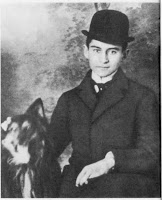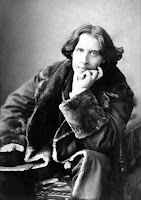 Before the Law
Before the LawIn front of the law there is a doorkeeper. A man from the countryside comes up to the door and asks for entry. But the doorkeeper says he can't let him in to the law right now. The man thinks about this, and then he asks if he'll be able to go in later on. 'That's possible,' says the doorkeeper, 'but not now'. The gateway to the law is open as it always is, and the doorkeeper has stepped to one side, so the man bends over to try and see in. When the doorkeeper notices this he laughs and says, 'If you're tempted give it a try, try and go in even though I say you can't. Careful though: I'm powerful. And I'm only
 the lowliest of all the doormen. But there's a doorkeeper for each of the rooms and each of them is more powerful than the last. It's more than I can stand just to look at the third one.' The man from the country had not expected difficulties like this, the law was supposed to be accessible for anyone at any time, he thinks, but now he looks more closely at the doorkeeper in his fur coat, sees his big hooked nose, his long thin tartar-beard, and he decides it's better to wait until he has permission to enter. The doorkeeper gives him a stool and lets him sit down to one side of the gate. He sits there for days and years. He tries to be allowed in time and again and tires the doorkeeper with his requests. The doorkeeper often questions him, asking about where he's from and many other things, but these are disinterested questions such as great men ask, and he always ends up by telling him he still can't let him in. The man had come well equipped for his journey, and uses everything, however valuable, to bribe the doorkeeper. He accepts everything, but as he does so he says, 'I'll only accept this so that you don't think there's anything you've failed to do'. Over many years, the man watches the doorkeeper almost without a break. He forgets about the other doormen, and begins to think this one is the only thing stopping him from gaining access to the law. Over the first few years he curses his unhappy condition out loud, but later, as he becomes old, he just grumbles to himself. He becomes senile, and as he has come to know even the fleas in the doorkeeper's fur collar over the years that he has been studying him he even asks them to help him and change the doorkeeper's mind. Finally his eyes grow dim, and he no longer knows whether
the lowliest of all the doormen. But there's a doorkeeper for each of the rooms and each of them is more powerful than the last. It's more than I can stand just to look at the third one.' The man from the country had not expected difficulties like this, the law was supposed to be accessible for anyone at any time, he thinks, but now he looks more closely at the doorkeeper in his fur coat, sees his big hooked nose, his long thin tartar-beard, and he decides it's better to wait until he has permission to enter. The doorkeeper gives him a stool and lets him sit down to one side of the gate. He sits there for days and years. He tries to be allowed in time and again and tires the doorkeeper with his requests. The doorkeeper often questions him, asking about where he's from and many other things, but these are disinterested questions such as great men ask, and he always ends up by telling him he still can't let him in. The man had come well equipped for his journey, and uses everything, however valuable, to bribe the doorkeeper. He accepts everything, but as he does so he says, 'I'll only accept this so that you don't think there's anything you've failed to do'. Over many years, the man watches the doorkeeper almost without a break. He forgets about the other doormen, and begins to think this one is the only thing stopping him from gaining access to the law. Over the first few years he curses his unhappy condition out loud, but later, as he becomes old, he just grumbles to himself. He becomes senile, and as he has come to know even the fleas in the doorkeeper's fur collar over the years that he has been studying him he even asks them to help him and change the doorkeeper's mind. Finally his eyes grow dim, and he no longer knows whether  it's really getting darker or just his eyes that are deceiving him. But he seems now to see an inextinguishable light begin to shine from the darkness behind the door. He doesn't have long to live now. Just before he dies, he brings together all his experience from all this time into one question which he has still never put to the doorkeeper. He beckons to him, as he's no longer able to raise his stiff body. The doorkeeper has to bend over deeply as the difference in their sizes has changed very much to the disadvantage of the man. 'What is it you want to know now?' asks the doorkeeper, 'You're insatiable.' 'Everyone wants access to the law,' says the man, 'how come, over all these years, no- one but me has asked to be let in?' The doorkeeper can see the man has come to his end, his hearing has faded, and so, so that he can be heard, he shouts to him: 'Nobody else could have got in this way, as this entrance was meant only for you. Now I'll go and close it'."
it's really getting darker or just his eyes that are deceiving him. But he seems now to see an inextinguishable light begin to shine from the darkness behind the door. He doesn't have long to live now. Just before he dies, he brings together all his experience from all this time into one question which he has still never put to the doorkeeper. He beckons to him, as he's no longer able to raise his stiff body. The doorkeeper has to bend over deeply as the difference in their sizes has changed very much to the disadvantage of the man. 'What is it you want to know now?' asks the doorkeeper, 'You're insatiable.' 'Everyone wants access to the law,' says the man, 'how come, over all these years, no- one but me has asked to be let in?' The doorkeeper can see the man has come to his end, his hearing has faded, and so, so that he can be heard, he shouts to him: 'Nobody else could have got in this way, as this entrance was meant only for you. Now I'll go and close it'."from The Trial, Chapter 9 towards the end.
The Trial, Franz Kafka.
Franz Kafka, Before the Law.
 The Doer of Good
The Doer of GoodIt was night-time and He was alone.
And He saw afar-off the walls of a round city and went towards the city.
And when He came near He heard within the city the tread of the feet of joy, and the laughter of the mouth of gladness and the loud noise of many lutes. And He knocked at the gate and certain of the gate-keepers opened to Him.
And He beheld a house that was of marble and had fair pillars of marble before it. The pillars were hung with garlands, and within and without there were torches of cedar. And He entered the house.
 And when He had passed through the hall of chalcedony and the hall of jasper, and reached the long hall of feasting, He saw lying on a couch of sea-purple one whose hair was crowned with red roses and whose lips were red with wine.
And when He had passed through the hall of chalcedony and the hall of jasper, and reached the long hall of feasting, He saw lying on a couch of sea-purple one whose hair was crowned with red roses and whose lips were red with wine.And He went behind him and touched him on the shoulder and said to him, 'Why do you live like this?'
And the young man turned round and recognised Him, and made answer and said, 'But I was a leper once, and you healed me. How else should I live?'
And He passed out of the house and went again into the street.
And after a little while He saw one whose face and raiment were painted and whose feet were shod with pearls. And behind her came, slowly as a hunter, a young man who wore a cloak of two colours. Now the face of the woman was as the fair face of an idol, and the eyes of the young man were bright with lust.
And He followed swiftly and touched the hand of the young man and said to him, 'Why do you look at this woman and in such wise?'
And the young man turned round and recognised Him and said, 'But I was blind once, and you gave me sight. At what else should I look?'
And He ran forward and touched the painted raiment of the woman and said to her, 'Is there no other way in which to walk save the way of sin?'
 And the woman turned round and recognised Him, and laughed and said, 'But you forgave me my sins, and the way is a pleasant way.'
And the woman turned round and recognised Him, and laughed and said, 'But you forgave me my sins, and the way is a pleasant way.'And He passed out of the city.
And when He had passed out of the city He saw seated by the roadside a young man who was weeping.
And He went towards him and touched the long locks of his hair and said to him, 'Why are you weeping?'
And the young man looked up and recognised Him and made answer, 'But I was dead once, and you raised me from the dead. What else should I do but weep?'
The Doer of Good, Oscar Wilde.
Oscar Wilde, The Doer of Good.
Down.




No comments:
Post a Comment